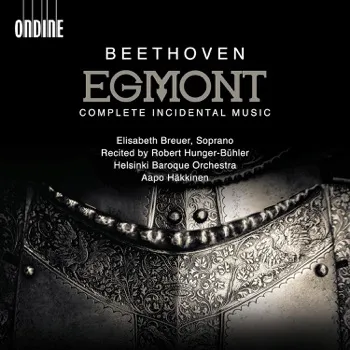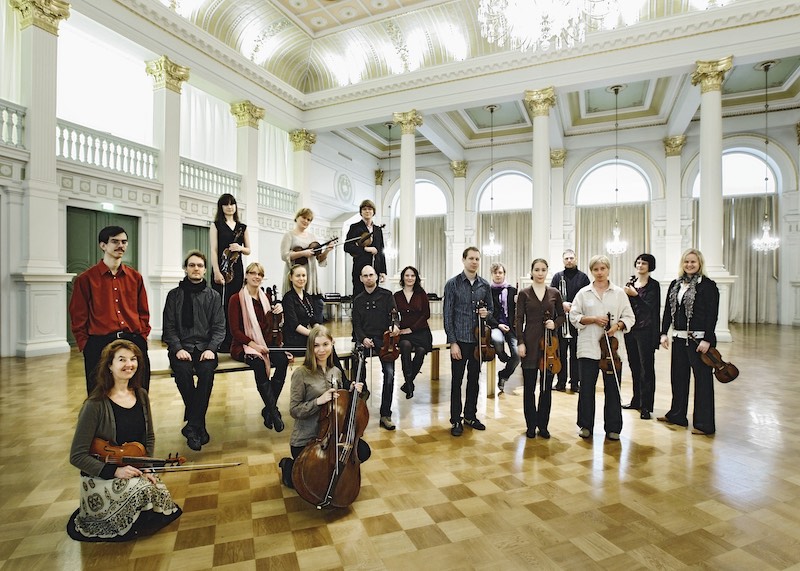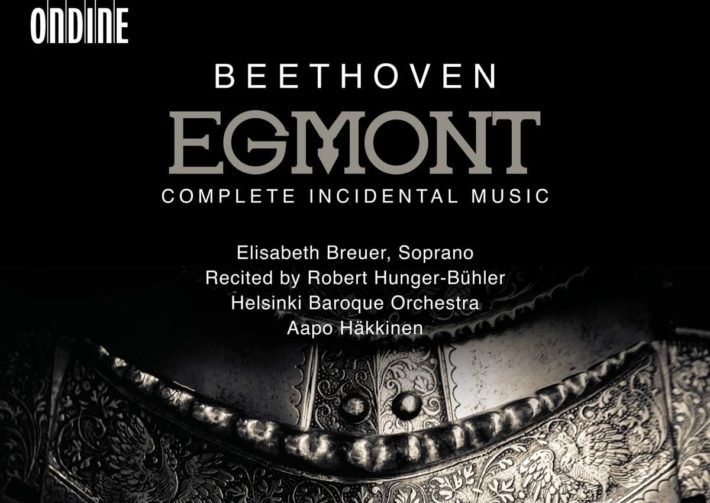The Egmont Overture is one of the most instantly recognizable and recorded of all Beethoven’s overtures. Composed to accompany Goethe’s heroic play, complete recordings of the incidental music do occasionally appear. With its nine pieces including the famous overture, this latest live addition to the Beethoven catalog from the Ondine label features the Helsinki Baroque Orchestra directed by Aapo Häkkinen, soprano Elisabeth Breuer and narrator Robert Hunger-Bühle, who gives an animated account of the spoken dialogue between movements.

Setting the scene — the programmatic overture is expressive and sonorous. Häkkinen keeps this restrained though with a sense of modest intensity, employing effective rubatti which enhance climaxes. These are not as big as one may expect when used to hear this as a concert overture, as Häkkinen reserves the grandest gestures for the final movement (“Siegessymphonie”), when the music peaks triumphantly.
Clearly, Häkkinen understands the textures of classical music and both the symphonic and operatic styles. Two examples come to mind; In “Zwischenakt II” (track 4), melody and accompaniment texture brings an operatic air, almost Mozartian. Here, Häkkinen doesn’t take Beethoven’s dynamic markings literally, but places them in the context of the character of the piece, a highly effective choice. And in “Zwischenakt III”, the layers of sound are crystal clear and distinctive, with an intrinsic sense of style.
Beethoven’s score includes two “lied” movements for soprano. In the first of these (“Die Trommel gerühret”, track 2), Soprano Elisabeth Breuer sings expressively, but the tone of her voice is inconsistent across her tessitura. In the second lied (“Freudvoll und leidvoll”, track 5), the tone is more consistent, with a purity and innocence, reminiscent of a boy treble. This approach works better, intensifying the meaning of the text, and the remarkable clarity of her diction needs to be acknowledged. In the linking narrations, actor Robert Hunger-Bühle understands the poetry and natural rhythm of the text, bringing an air of authenticity and authority. He is mostly restrained, saving the biggest gestures for the most dramatic moments as in the final lines of “Melodram” (track 9), which aids and enhances the exciting theatrics of the final orchestral flourish.
The orchestral sound is attractive overall, noticeably the brass and flawless woodwind. The strings present a richness of sound not always achievable on period instruments, a high compliment to the members of the Helsinki Baroque Orchestra. Occasionally, intonation is blemished (as in the “overture” and “Zwischenakt I”), but those instances are limited and are a pitfall of natural gut strings, especially under the circumstances of a live recording; they do not detract from the energy, spirit, emotional intensity and overall conviction of the performance. There are moments in which Häkkinen’s fortepiano comes to the fore, which enriches the period sound, but they are disappointingly few and far between. Shame really, as they do add something distinctive to this recording.
The booklet includes a full list of players, texts and translations with detailed program and musicological notes, outlining the action. The overall orchestral balance throughout the recording is good and well captured with an appropriate sense of space. Recorded between December 2018 and January 2019 in Musiikkitalo, Helsinki, there is a natural acoustic, with sufficient reverberance, which works well both for the orchestral sound and spoken narration. The occasional disturbance from the audience is minimal, but on occasions – noticeable. The drive, pacing and excitement of a live performance are evident throughout, making this an enlightening release.

This is not a piece recorded often, certainly not in full. Häkkinen’s capturing of the drama and orchestral colors matches Herbert Von Karajan’s 1961 version with the Berlin Philharmonic, although obviously with a rather more delicate period-appropriate palette. Karajan omits most of the spoken dialogue (Erich Schellow narrating Egmont in the penultimate movement “Melodrama”), and his soprano is the legendary Gundula Janowitz, who brings a commanding air to both of the “lied” movements, but lacks clarity of text. Though Breuer’s voice doesn’t have the same depth of tone as some of the other recordings available, her enunciation and diction are the clearest and cleanest. For a comparable period-instruments recording, Martin Haselböck’s version with Orchester Weiner Akademie comes with an additional narration in English.
For those familiar with Beethoven’s symphonic output and looking to expand their knowledge, this would enhance any library.
Beethoven – Egmont – Complete Incidental Music, Op. 84
Elisabeth Breuer – Soprano
Robert Hunger-Bühler – Recitation
Helsinki Baroque OrchestraAapo Häkkinen – Conductor




















